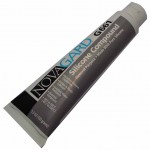Thermally Conductive Compounds
Thermally Conductive Compounds
These products offer moisture resistance and are resistant to corrosion and oxidation. These products are suited for the electrical and electronic industries.
Select a product from the list to review additional characteristics.
G641
Ideal for thermocouple wells, power diodes, transistors, semiconductors and ballasts
Excellent head transfer compound for electrical and electronic industries
Outstanding long-term storage stability without separation
G644
Ideal for thermocouple wells, power diodes, transistors, semiconductors and ballasts
Excellent heat transfer compound for electrical and electronic industries
Outstanding long-term storage stability without oil separation
G644 is a lower viscosity or softer version of G641
Material Compatability
Generally, silicone materials have the following impact on material properties:
Silicone Rubber – Tends to swell, soften and decrease in tensile strength
Fluoro Rubber – No effect
Organic Rubber – Sight shrinkage, hardening and loss of physical properties
Plastic – No effect on polycarbonate, phenolic, polystyrene nylon, methacrylics or PTFE. Slight swelling or shrinkage may occur in polyacetal, polyethylene, polypropylene or PVC
Handling and Safety
Safety Data Sheets (SDS) and Technical Data Sheets (TDS) are available from Novagard Solutions. You can download SDS and TDS sheet by visiting the MDS/TDS page.
Cleanup of silicone greases and compounds can be accomplished using non-polar solvents such as mineral spirits. They are soluble in Stoddard solvent, toluene and xylene. Caution should be observed whenever handling solvents.
Silicone greases are not suitable for use in contact with high concentrations of oxygen or highly oxidative materials. Contact with high pressure oxygen, ozone, peroxided or fuming nitric acid can result in fire or explosion. Silicone materials are damaged by exposure to strong mineral acids (e.g. sulfuric, hydrochloric, nitric), strong alkaline (e.g. sodium or potassium hydroxides), nitrates or peroxides.

